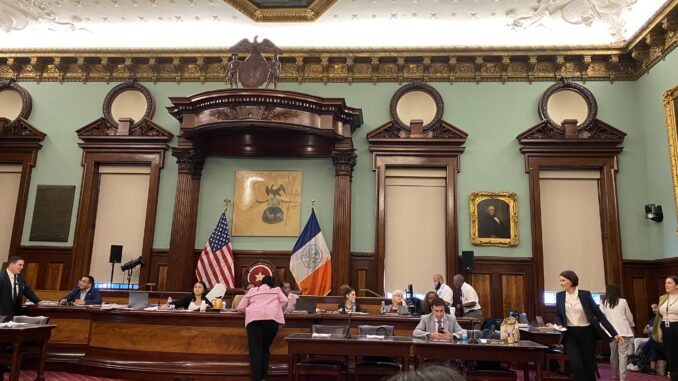
BY DAMIEN OVALLE
In a September 20 city council hearing, representatives of The United Federation Of Teachers (UFT) and the City Department Of Education (DOE) urged the City Council Committees on Education & Technology to begin using Artificial Intelligence (AI) in schools citywide. A vote was not called for and the committee remains on the fence about the use of AI in schools. Until May 2023, AI was banned in schools.
“We still have more work to do,” said Melanie Mac, Senior Executive Director of the DOE’s Office of Postsecondary Readiness.
Previously, AI was banned throughout NYC schools as it was closely associated with ChatGBT, an Open AI site that was used for cheating and plagiarism.
Artificial intelligence (AI) in recent years has emerged as the new age technology, similar to computers and the internet in the 1990s. In AI, computers mimic humanlike abilities to think and communicate using logic and math with built in software. Artificial Intelligence or AI has grown to be a technology many people don’t understand, and one many would rather pass on.
AI has been more involved in the classroom than before. John Jay College used AI to determine which students were at risk of failing to graduate and used this information to boost their graduation rate by 32%, helping upwards of 200 students. AI has also been used at Boise State University to mimic conversations with Shakespeare. Students were able to have a back and forth conversation speaking in Shakespearean English with the computer.
As the tech sector advances every year, the fear of both the Committee on Education and the UFT is that their students won’t be prepared for the workforce once they’re ready. “We need to be five years ahead of the workforce,” said Council Member Robert F. Holden.
“The future of education is now,” said Mac.
The creation of the Policy Lab is set to be completed by June 2024 which would teach adults and students as young as kindergarten about generative AI and computational literacy. But Council Member Vickie Paladino raised her concern over teaching kids that young about such a complex topic. “This will cause a ripple effect in every district in the city…I have concerns that it is being introduced [to students] as young as two and three years old when their minds are just developing.”
New York City started an initiative to expand access to technology in 2020 when Covid-19 showed how many students lacked access to technology or even a stable internet connection according to the Chairperson of the Committee of Education, Rita Joseph. Having given 550,000 IPads and 250,000 chromebooks, New York City and the D.O.E were put in a difficult situation. When Open AI sites like ChatGBT became popular amongst the students, School leaders banned the usage of it due to alleged uses for cheating or plagiarism.
The Council raised more concerns with the technology. Back in 2022, a data breach by a NYC Schools vendor, ILluminate Education, leaked over 800,000 students’ private information. Other data breaches occurred this past winter when upwards of 80,000 faculty were affected and again in June when more than 19,000 DOE documents were leaked from the main server.
With major concern and major praise, the city council committees remain split on the inclusion of AI technology for public school students across the city. “We come humbly knowing we don’t have all the answers,” said Mac.

